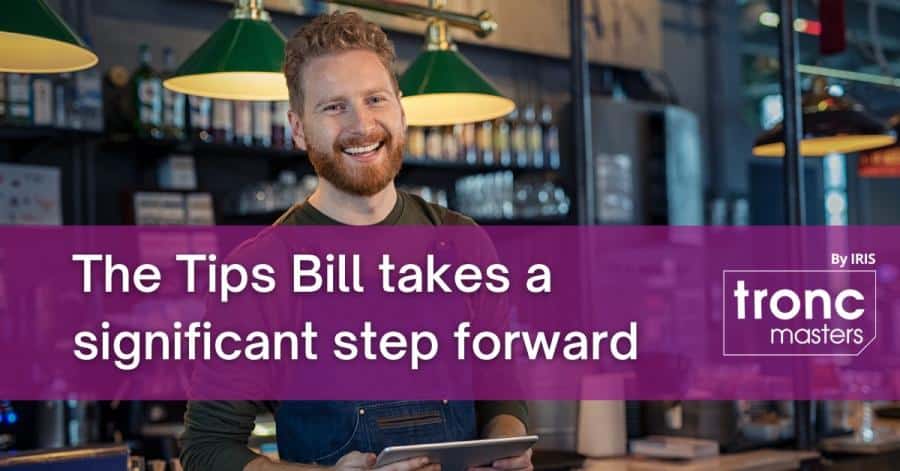
There has never been a more critical time for businesses to get tip distribution right.
The reason? The Employment (Allocation of Tips) Bill, which will say 100% of tips and service charges must go to staff – not the hospitality business – has taken one step closer to reality.
It passed its final stage in the House of Commons without any new clauses or amendments. It will next go before the House of Lords.
To pass through the House of Lords, there will again be several readings where the Bill can be debated and any changes suggested, then the statutory Code of Practice must be drawn up.
If the Bill becomes law (which is highly likely), tips and service charges will have to be paid to staff members by the end of the following month.
And if all tips have to go to staff by law, this means none should be lost by the hospitality business through inefficiencies because fees will not be able to be recovered from the monies received.
The original Bill intended to let businesses recover fair fees that were 100% applicable to the operation of service charge or a tronc scheme, such as card transaction fees and tronc scheme administration fees. This changed however during the second reading in the first phase, and now the Bill has been amended to state that no deductions other than statutory (such as tax and NI) can be deducted. It’s not yet clear whether a tronc scheme, where employees have a say in how the monies are distributed through their troncmaster or tronc committee, may vote to have fees recovered or not. Based on the latest Impact Assessment, it appears to be that no matter the cost to the business, the government’s intention is to prevent all deductions, whether fair or not.
A major change ahead
The progress of the Private Members’ Bill, sponsored by Virginia Crosbie MP (Cons), might have been a surprise to some. These bills are raised by MPs who are not a part of the cabinet and so generally don’t get enacted.
The Bill will change a lot for the circa 2.4 million hospitality workers in the UK. Right now, conscience and reputation are the only things stopping businesses from pocketing the cash should they wish to because the current Code of Practice is only voluntary. Soon, they will have to have a written policy and hold records explaining how they distributed the money. Employees will have the right to request information on how their tips have been allocated at any time, and records could be requested in the case of a complaint that has gone to a tribunal.
Currently, there are four ways in which businesses can administer tips and service charges. They can:
- Keep everything and pass no benefit to employees, resulting in almost a third of the money being paid to HMRC.
- Pass on most of the money through payroll but keep some (often about 10%) for admin costs. Doing that means giving back more than 50% in taxes.
- Increase payroll basic rates rather than sharing tips separately, losing more than half the money in the process.
- Put a tronc scheme in place. With a tronc scheme, about 20% is paid in tax by staff, so employees get the best deal. There’s also no National Insurance cost to the hospitality business. With a tronc, the minimum is paid back to the treasury.
If you currently pass on the tips, then option four, the tronc system, is the most prudent way to achieve maximum efficiency.
Soon, however, troncs will become all but a necessity.
Tronc schemes are tax-efficient and HMRC-compliant. They set up the rules around the distribution of pooled tips in a business and are overseen by a ‘Troncmaster’. A Troncmaster must remain independent of business owners, directors, or anyone with hiring responsibilities.
However, as we have learnt, businesses that try to go it alone with their tronc scheme can make mistakes.
Many hospitality businesses are still not properly prepared
Shockingly, research by IRIS Software, in partnership with Censuswide (Sep 2022), has found that:
• 67% of hospitality businesses know about tronc schemes, but…
• 46% of companies pay pooled tips through payroll without using a tronc, meaning that…
• Nearly 1.2 million hospitality workers and the businesses they work for are losing out.
Perhaps doubly concerning, the same survey revealed more than 50% of companies using a tronc scheme had non-compliant Troncmasters; they were either a Director/Business Owner (30%) or a Manager (38%).
So how do you get it right?
Troncmasters will ensure your tip distribution is allocated the right way, saving you and your staff money, providing ease of mind for your leadership team, and taking the stress off staff who otherwise would be burdened with a difficult task.
Our specialists can advise your business on setting up a tronc scheme, or you can outsource it entirely to us, letting our experienced team take care of everything.
Click here to find out more.
